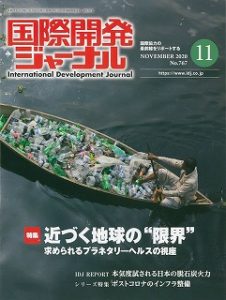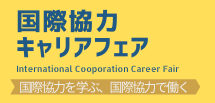IDJ English - Series: “Nautical Map for the Post-Corona Era”
Series: “Nautical Map for the Post-Corona Era”
Cooperation in the spirit of multilateralism supporting the construction of an international framework
Shunsuke Mabuchi
Senior Advisor, Global Delivery Team, Bill & Melinda Gates Foundation
The COVID-19 pandemic has strongly shaken the political and economic structure of the world including in developing countries. What kind of seismic shift will occur in the world in the future? And how should Japan overcome these big waves? As one of the experts of the development sector, Shunsuke Mabuchi of the Bill & Melinda Gates Foundation talks about changes in the trends of global health and the role that Japan should play.
Crisis in fundamental healthcare services
The spread of COVID-19 has accelerated the need for support in the field of healthcare, especially in developing countries. The donor aid from developed countries and international organizations, as well as the interests of developing countries, are focused on measures against COVID-19. As a result, crises in other healthcare fields, especially basic healthcare services, are gradually becoming serious.
For example, a survey of 63,000 healthcare facilities in developing countries found that the number of children vaccinated against all necessary vaccinations fell by 35 percent in Liberia and 13 percent in Nigeria. In addition, maternal and child healthcare services are becoming difficult to receive in developing countries.
The reasons behind this include “avoiding the use of medical facilities for fear of infection” and “not being able to pay due to the worsening economic situation”, as well as reasons such as “health workers are busy with the COVID-19 countermeasures” and “stagnation in the distribution of medical supplies”.
A deepening crisis in health services could increase the number of deaths of children beyond the number of deaths caused by COVID-19. According to a study by Johns Hopkins University, the pessimistic scenario estimates a 45 percent increase in deaths among children aged 5 and under in the next six months, an increase of 1.2 million in numbers. If this becomes a reality, achieving Goal 3 of the Sustainable Development Goals (SDGs) to “ensure healthy lives and to promote the well-being for all at all ages” will become even more elusive.
Building a co-purchase mechanism
To stop the spread of COVID-19, the Foundation has taken a proactive approach. The first is cooperation with private companies. Medical science experts affiliated with the Foundation have been engaged in vaccine development and drug discovery support for a long time. Among the COVID-19 countermeasures, we are working with pharmaceutical companies to develop and manufacture vaccines and therapeutics. If all goes well, the vaccine is expected to come into practical use soon. It has realized an unprecedented cooperation between pharmaceutical companies, to share production lines to produce larger quantities of vaccines and therapeutics faster.
The second is quick and flexible funding. Vaccines usually move to mass production after tests confirm their effectiveness and safety. However, we have been funding the development of manufacturing capability for promising vaccines, even before the results of the trials have come out. This means, when the effect is confirmed, the vaccine is already ready for production and can be delivered to those who need it without any time lag.
The third is support for the development of an international framework. Presently, the concept of “nationalism” in response to COVID-19 is spreading and the purchase of vaccines is progressing mainly in developed countries. This would prevent the developing countries with most need from accessing vaccines, which could have a significantly negative impact on public health. To end the COVID-19 crisis globally, providing vaccines, therapeutics and test kits equitably to developing countries is an urgent issue.
The Foundation believed that “multilateralism is the way to solve it” and, in collaboration with the World Health Organization (WHO) and other international organizations, we established a partnership called “Access to COVID-19 Tools Accelerator” (ACT-Accelerator). Countries, as well as international and private organizations, are working together to support the rapid development and manufacture of vaccines, therapeutics and new test kits, with the aim of delivering them fairly to people around the world, including developing countries.
As for vaccines, an international mechanism for pooled vaccine procurement “COVAX” has been established within the ACT-Accelerator, and the Foundation has called for participation from both developed and developing countries. Under this mechanism, together with the Foundation, the countries that can purchase vaccines with their own funds and donor countries that support developing countries pool funding and purchase vaccines from pharmaceutical companies. What’s groundbreaking is that you can make purchase agreements with many companies, which is something a single country cannot do on its own.
Because of the large number of contracts, the possibility of buying a vaccine that has been verified for effectiveness and safety is dramatically increased. The vaccines purchased will also be distributed to developing countries participating in COVAX, so they can access the vaccines at the same time as developed country participants.
As of October 1, 2020, 76 middle- and high-income countries have shown interest in COVAX, and the combined number of developing countries is expected to be a partnership of about 170 countries. Under COVAX, the partnership aims to deliver 2 billion doses of vaccines to those in need by the end of 2021, aiming to avoid a catastrophic outcome for these countries.
Significance of a global framework
It is estimated that for every month the COVID-19 pandemic ends earlier, the world could prevent $375 billion in economic losses globally. In addition to preventing further economic losses, it is important to establish a strong and functioning international cooperation mechanism that include developing countries, such as the international partnership described above, and to bring infections to an end, everywhere.
Under the concept of “human security”, Japan has long promoted universal health coverage (UHC), through official development assistance (ODA), as well as international cooperation in the field of global health. I have high expectations for Japan in taking on a strong leadership role in international COVID-19 response, through its participation in ACT-Accelerator and COVAX. On September 15, 2020, Japan was one of the first countries to announce its participation in COVAX and contributed 17.2 billion yen. At the United Nations General Assembly in the same month, Prime Minister Yoshihide Suga indicated Japan’s full support for a framework ensuring equitable distribution of treatments and vaccines.
If we can overcome this crisis well, we will also see a path to address the basic health service crisis described at the beginning. The Foundation will continue working to improve the efficiency of immunization programs and enhance delivery of healthcare services, with the view to improve the quality of such basic services in developing countries. With the spread of COVID-19, infectious diseases have become recognized as one of the most important health, economic and social security issues in the world. Based on the lessons learned from the pandemic, it is necessary to think about “how to rebuild the mechanisms of infectious disease control on a global scale and in each country”.
Japan can also contribute at this juncture. During the spread of the Ebola virus in Western Africa from 2014 to 2016, Japan, together with the Gates Foundation and the UK’s Wellcome Trust Foundation, established the Coalition for Epidemic Preparedness Innovations (CEPI) in January 2017, to support research, development and production of vaccines and therapeutics. I look forward to seeing Japan demonstrating leadership in building and making an impact around the establishment of a global framework again. Now is the time to promote international cooperation in accordance with the spirit of multilateralism.
“International Development Journal”, 2020, November edition
(The data indicated in this article was the latest data available at the time of interview.)
*****以下、日本語原文*****
連載 : ポストコロナ時代の航海図
ワクチンの公正な配分へ ―今こそマルチラテラリズムの精神に則った協力を
ビル&メリンダ・ゲイツ財団
グローバルデリバリーチーム シニアアドバイザー
馬渕 俊介氏
新型コロナウイルスのパンデミックにより、開発途上国をはじめ世界の政治・経済構造は大きく揺らいでいる。世界では今後、どのような地殻変動が起こるのか。そして日本はこの荒波をどう乗り越えていくべきか。さまざまな分野の識者が「航海図」を示す本連載の今回は、ビル&メリンダ・ゲイツ財団の馬渕俊介氏が国際保健分野における潮流の変化や一部の先進国に「自国第一主義」が見られる中で日本が果たすべき役割について語る。
基礎的保健医療サービスの危機
新型コロナの感染拡大を受けて途上国を中心に保健医療分野の支援が急務になっている中、先進国や国際機関といったドナーの援助、そして途上国の関心は新型コロナ対策に集中している。その結果、次第にそれ以外の保健医療分野、特に基礎的な保健医療サービスの危機が顕在化しつつある。例えば、途上国の6万3,000の保健医療施設で行われた調査では、必要な全ての予防接種を受けた子供の数が、リベリアで35%、ナイジェリアで13%減少していた。加えて、途上国では母子保健のサービスも受けにくくなっている。「感染を恐れて医療施設の利用を避ける」「経済状況の悪化により支払いができない」という保健医療サービスを受ける側の理由に加えて、「ヘルスワーカーが新型コロナ対策に忙殺されている」「医療品をはじめとする医療物資の供給が滞っている」といった理由もある。
保健医療サービスの危機が深刻化すれば、子供の死亡数が増加し、新型コロナによる死亡数を上回る可能性がある。米ジョンズ・ホプキンス大学の研究によると、悲観シナリオではこの先6カ月間で5歳以下の子供の死亡数が45%増加、数にすると120万人増加すると試算されており、憂慮している。もし現実となったら、持続可能な開発目標(SDGs)の目標3「すべての人に健康と福祉を」の達成もさらに遠のくことになるだろう。
共同購入のメカニズムを構築
新型コロナの感染拡大を食い止めるため、当財団としても積極的なアプローチを仕掛けている。一つ目は、民間企業との連携だ。かねてから当財団に所属する医科学の専門家がワクチン開発や創薬支援に従事していたが、新型コロナ対策においては製薬会社と組んで、ワクチンや治療薬の開発と製造を目指している。上手くいけば、ワクチンは年内あるいは年明けにも製造開始となる見込みだ。また、より早く大量のワクチン、治療薬を製造するために、製薬会社同士で製造施設を共有するという異例の協力も実現することになった。
二つ目は、素早く柔軟な資金提供だ。ワクチンは通常、試験で効果と安全性が確認されてから大量生産に移る。だが、当財団が有望と見込んだワクチンについては、試験の結果が出る前から製造のための資金を拠出している。こうすることで、効果が確認された時にはすでにワクチンの製造準備がされており、タイムラグなしで必要とする人々へ届けることができる。
三つ目は、国際的な枠組みの構築にかかる側面支援だ。目下、新型コロナの対応においても「自国第一主義」が広がっており、先進国を中心にワクチンの買い占めが進んでいる。これでは最も支援を必要とする途上国がワクチンにアクセスできず、公衆衛生に甚大な悪影響が出かねない。世界のコロナ禍を収束させる上では、途上国にも公正な形でワクチン、治療薬、検査キットをいかに提供していくかが喫緊の課題となっている。
そこで当財団は、「マルチラテラリズムこそ解決への道」と考え、世界保健機関(WHO)をはじめとする国際機関と連携して「Access to COVID-19 Tools Accelerator」(ACTアクセレレーター)というパートナーシップを構築した。各国や国際機関、民間団体が協力してワクチン、治療薬、新しい検査キットの迅速な開発・製造を支援し、途上国を含む世界中の人々に公正に届けることを目指している。
このうちワクチンについては、ACTアクセレレーターの中にワクチン共同購入の国際的メカニズム「COVAX」が構築され、当財団は先進国、途上国ともに参加を呼び掛けている。このメカニズムでは先進国などワクチンを自己資金で購入できる国、途上国支援をするドナー国、そして当財団が資金を出してプールし、製薬会社からワクチンを購入する。画期的なのは、一つの国では成し得ない多くの企業と購入契約を結ぶことができる点だ。多くの契約を結べるため、効果と安全性が検証されたワクチンを購入できる可能性が飛躍的に上がる。そうして購入されたワクチンはCOVAXに参加する途上国にも配分されるため、途上国も先進国と同じタイミングでワクチンにアクセスできる。
10月1日時点でCOVAXに76の中高所得国が関心を示しており、途上国を合わせると、約170カ国が参加するパートナーシップになる見込みだ。COVAXの下、2021年末までに20億回分のワクチンを必要な人に届け、最悪期からの脱出を後押しすることを目指している。
世界的な枠組みの構築にも期待
新型コロナは1カ月早く収束させる毎に世界全体で3,750億ドル(約40兆円)の経済損失を防げると試算されている。さらなる経済損失を防ぐためにも、上述した国際的パートナーシップなど、途上国を含めた国際協力の仕組みをしっかりと機能させて、世界全体で感染を収束させることが重要だ。
日本は長らく「人間の安全保障」というコンセプトの下、政府開発援助(ODA)でユニバーサル・ヘルス・カバレッジ(UHC)を推進し、グローバルヘルス分野における国際協力を進めてきた。今回の新型コロナ対策においては、ACTアクセレレーターやCOVAXに対する日本の強いリーダーシップを期待したい。
日本は9月15日にいち早くCOVAXへの参加と172億円の資金拠出を表明したほか、同月の国連総会で菅義偉首相が治療薬やワクチンの公平な確保に向けた枠組みを全面的に支援する考えを示した。この危機を上手く乗り越えられれば、冒頭に述べた基礎的な保健医療サービスの危機に対処する道筋も見えてくるだろう。当財団としても予防接種の効率化やコミュニティー主体の保健医療サービスの提供強化など、途上国の基礎的な保健医療サービスの効率化を推し進める所存だ。
また、新型コロナの感染拡大によって、感染症は世界における健康、経済、社会の安全保障上の最重要課題として認識されるようになった。今回のパンデミックを教訓として、「世界規模、そして各国の感染症対策の仕組みをどう再構築するか」を考えていく必要があるが、日本はこの局面でも貢献できるだろう。2014年から16年に西部アフリカでエボラウイルス病が広がった際は、日本が当財団、および英国のウェルカム・トラスト財団などと共に資金を拠出し、ワクチンや治療薬の研究開発と製造を支援する「感染症流行対策イノベーション連合」(CEPI)を2017年1月に設立した。
今回も同様にグローバルな枠組みを構築、または変えていくリーダーシップを発揮してもらいたい。今こそマルチラテラリズムの精神に則った国際協力を推し進めていく時だ。
『国際開発ジャーナル』 2020年11月号掲載記事





